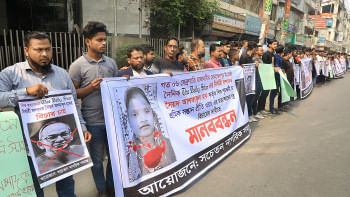Children must be protected from abuse and torture

A 15-year-old worker at a local shop in Feni was returning to work after saying Zuhr prayers, when a man sought his help to lift up a bag. Unsuspecting, the boy followed him to a nearby shopping centre, where the stranger and another man subjected him to unspeakable, bestial acts of sexual abuse and torture. Injured and bleeding, the boy was rescued by his employer some two hours later and taken to the hospital where a surgery was required to remove the bathroom cleaning brush handle that the criminals had shoved up his back.
This reminds one of the 12-year-old mill worker in Bogura, who was killed by his co-worker in 2019 by pumping air into his body. Similar incidents of physical torture and sexual abuse of children have taken place before, with many of the victims succumbing to the injuries. Child abuse reports have become a regular feature in our newspapers and newsfeeds, portraying the picture of a society with a festering rot at its core. Unfortunately, we are doing little to remove the rot.
According to a recent Prothom Alo report in 2023 the Child Helpline 1098—operated by the Department of Social Services under the Child Sensitive Social Protection in Bangladesh (CSPB) project—received 15,785 calls, which is almost double of the 8,021 calls received in 2022. While the increasing number of calls mean that more people are now aware of this helpline and are overcoming their fears of stigma and uncertainty to seek help when required, the staggering number of such reported incidents reveal a grim picture of its widespread prevalence. We do not have enough research to understand the actual scope and scale of this social malady.
Between January and April 2024, according to Ain O Salish Kendra (ASK), 226 children have been subjected to violence and abuse in the country, 176 children have been killed. Of them 37 were below the age of six. From being tortured at domestic sphere and outside, to abduction and rape, children—innocent, helpless, unsuspecting—are highly vulnerable to multiple forms of abuse. In 2023, 1,013 children were subjected to violence, 485 had been killed, of whom 116 were below the age of six.
As per the ASK data, cases were filed in about 60 percent of these incidents. One major reason why people do not seek legal redress is the power enjoyed and exercised by the perpetrators, who coerce the victims and their families into silence. Then there is the fear of social stigma that the victims and their family would have to endure for the rest of their lives if word got around. Even if the victims and their families overcome such fears and reach out to the law enforcers to file cases, often the latter side with the perpetrators in exchange for money or leverage.
To top it all off, the delay in delivering justice in such cases are a major discouraging factor. A 2022 report by the Financial Express reveals that 43,114 cases related to women's repression were pending for over five years in 99 women and children repression prevention courts across Bangladesh as of June 30, 2022. From filing cases and conducting investigation, including DNA tests, to presenting the case in the court, every stage is mired in bureaucratic red tape and a frustrating lack of progress. No wonder then that the traumatised families often shy away from seeking legal recourse.
We have become a society in which innocent, vulnerable children have become a tool to satiate the filthy desires of the stronger—in various forms, from subjugation to sexual gratification—be it within the security of one's own home, school or outside. Unfortunately, we have become so desensitised that when they are tortured and abused even in front of us, we merely take out our phones to make TikTok videos or Facebook lives, instead of rushing to the rescue of the child victims.
These incidents leave lasting mental and emotional scars on children. Their self-respect and dignity are compromised forever and they often fail to recuperate from these horrors. They often demonstrate a lack of empathy, failing to create emotional bond with others. They grow into adults who lack self-confidence and often suffer from inferiority complex. Many children develop psychological issues like schizophrenia, bi-polar disorder and chronic depression.
Families have to be more watchful and protective of their children. They should have frank conversations with their children explaining to them good touch and bad touch, their basic rights as children, and the realities in which we live. The home environment should make children feel safe and comfortable to talk and share their thoughts and nightmares without fear of being victim blamed. Most importantly, the families, especially the parents, should prioritise social and family values in their conduct so that they can spread the same values among their children.
Schools should have separate curriculum on child rights and safe conduct. The government should partner with the INGOs for technical assistance and resources to train teachers in primary and secondary schools on child psychology and institute effective sexual harassment complaints committee in each educational institution.
The government and judiciary should look into the perennial issue of case backlog—which stood at around four million in all types of courts as of June 2023—and expedite delivery of justice. Perpetrators should be slapped with the highest, exemplary punishment for child abuse and torture. Law enforcers should be held accountable where evidence of their collaboration with the perpetrators is found. There should be adequate counselling opportunities for children who have been victimised. Families should overcome their fears and seek justice for their children. People in general should immediately intervene if they see children getting abused in public.
Child abuse and torture need to be completely eliminated from the society to ensure a safe and comfortable space for our children where they can grow and realise their potential to the fullest.
Tasneem Tayeb is a columnist for The Daily Star. Her X handle is @tasneem_tayeb
Views expressed in this article are the author's own.
Follow The Daily Star Opinion on Facebook for the latest opinions, commentaries and analyses by experts and professionals. To contribute your article or letter to The Daily Star Opinion, see our guidelines for submission.

 For all latest news, follow The Daily Star's Google News channel.
For all latest news, follow The Daily Star's Google News channel. 










Comments